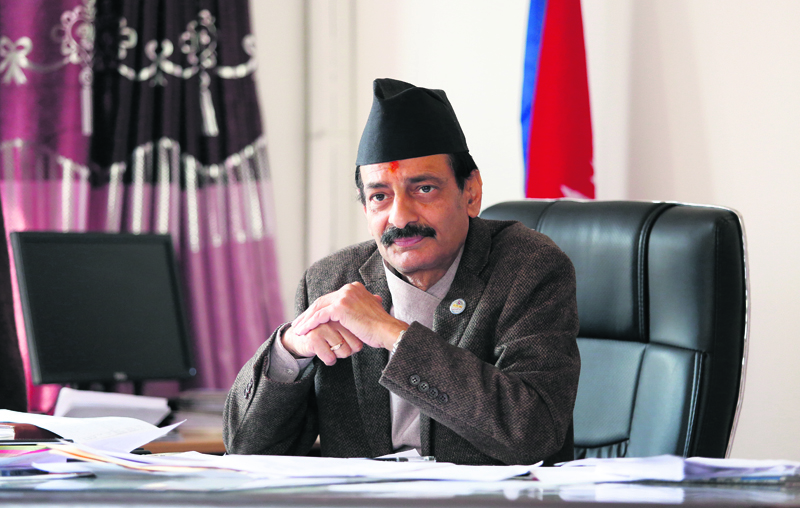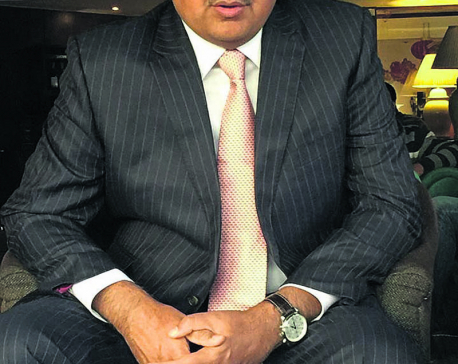
OR
Investors' perception toward Nepal has changed
Published On: March 22, 2017 01:30 AM NPT By: Republica | @RepublicaNepal

Nabindra Raj Joshi, who was the deputy mayor of Kathmandu Metropolitan City after the democratic movement of 1990, is the Minister for Industry. He has been actively engaged in endorsing long-stalled Acts and Policies, including SEZ Act and Company Act (Amendment), which are part of the second generation economic reforms in Nepal, through the parliament. Joshi, who has received applause from all quarters for hosting 2nd Nepal Investment Summit after a gap of 25 years, talked to Kuvera Chalise and Santosh Neupane of Republica on various issues related to business environment in Nepal. Excerpts:
You have successfully organized Investment Summit in Nepal after a gap of 25 years. Investment commitments worth $14 billion were made in the summit. How was it possible?
I started planning for the summit after 21 days of swearing-in ceremony. Many said that preparation of at least two years would be needed. They said only a few investors would turn up in such a short notice. But I continued my preparation for the summit. I invited ambassadors of different countries in Nepal and told them that Nepal wants to send positive message to the world through the investment summit. They asked me what kind of message does Nepal want to send to the world. I told them that the country is marching into a path of economic development, ending long-running political instability. The plan to organize investment summit had disseminated positive message about Nepal to the rest of the world. The government has been reforming policy and forging consensus among major political parties on economic development. It has also helped to create an investment-friendly environment in the country. The investment summit materialized because of our hard work and long-term vision.
The summit has managed to attract letter of Intent (LOI) for investments worth billions of rupees. How can we convert such commitments into real investment?
We have been failing to attract foreign investment since a very long period of time due to many issues emerging from our internal problem. With the successful completion of the Investment Summit, I have felt that my responsibility has increased. I have to work to convert the Letter of Intent (LoI) into commitments. There are many challenges, but Nepal has sent a positive message to the world which is a great achievement in itself. Now, we should convince interested investors that our policy will not change even after the change of the government. Also, the newly brought laws will make an investment-friendly environment in the country. Likewise, we have to make entry, operation and exit of industries simple and easier. In China, the government provides land to the investors free of cost. But the infrastructure should be built by the investors themselves. We are also creating similar environment in the country.
One has to pay more tax for import of raw materials compared to readymade products. How can the country march toward industrialization in such tax regime?
The government is committed to resolve the problem. Foreign investors have been raising the issue of double taxation. Though the Ministry of Finance has always been conservative on these issues, we are working on it. Investment promise to Nepal has created a ray of hope. Countries like Malaysia, Vietnam, and Laos have managed to attract foreign investment because they have investment-friendly environment. We are also trying to create similar environment here.
How can foreign investment be safe in Nepal if the country can't ensure safety of domestic investment?
First, I want small and cottage industry to flourish. The establishment of these industries will create enough employment in the country. I have said that the government will register 100,000 small and cottage industry in 50 days. The government has made a provision to register small and cottage industry for free. This kind of move will certainly promote domestic industry. I have also been inviting foreign investment for mega projects like East-West Railway and Kathmandu-Pokhara-Bhairahawa Railway. If these projects materialize, small and cottage industries will benefit a lot.
You have been saying that the government will revive closed industries. How has been the progress?
The Nepal Drugs Ltd is already in operation. We are bringing new plants for the drugmaker. We also have plans to reopen Butwal Spinning Mill and Hetauda Textile Industry. The erstwhile government had planned to sell the textile industry for only Rs 75 million. Instead of selling the industry for peanuts, we have decided to breathe new life into it. We are also studying the possibility of reopening Biratnagar Jute Mill. There have been some technical problems in Oriend Magnesite.
Similarly, we have also prepared a taskforce for to attract a private party to operate Gorakhali Rubber Industry.
Though it has already been eight years since the government announced a policy to build infrastructure for cement factories, nothing has been done in this direction. Why is causing the delay?
The main problem is the lack of funds. It needs huge investment to build roads in hilly areas where most of the limestone mines are located. Around Rs 70-80 million set aside for the purpose is simply insufficient. Also the responsibility of building infrastructure like roads should be given to respective government agencies. For example, road construction should be handled by the Department of Roads and electricity supply has to be arranged Nepal Electricity Authority.
You May Like This

Outreach Nepal lifts Nepal Ice AAN Futsal
KATHMANDU, May 13: Outreach Nepal has lifted the first ever Nepal Ice AAN Futsal Tournament 2018 defeating Media Basket by a... Read More...

Investors intend to pour $ 13.52 b into Nepal
KATHMANDU, March 4: Investors both foreign and domestic have shown keen interest in investing in Nepal. They signed letters of intent... Read More...

Gulf Oil has seen a lot of opportunities in Nepal
Ravi Chawla, the managing director of Gulf Oil Lubricants India Ltd, was recently in Nepal, along with former Manchester United... Read More...

Just In
- World Malaria Day: Foreign returnees more susceptible to the vector-borne disease
- MoEST seeks EC’s help in identifying teachers linked to political parties
- 70 community and national forests affected by fire in Parbat till Wednesday
- NEPSE loses 3.24 points, while daily turnover inclines to Rs 2.36 billion
- Pak Embassy awards scholarships to 180 Nepali students
- President Paudel approves mobilization of army personnel for by-elections security
- Bhajang and Ilam by-elections: 69 polling stations classified as ‘highly sensitive’
- Karnali CM Kandel secures vote of confidence


















Leave A Comment